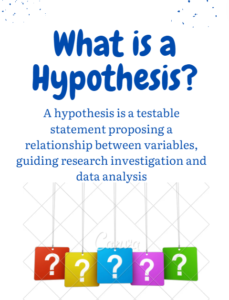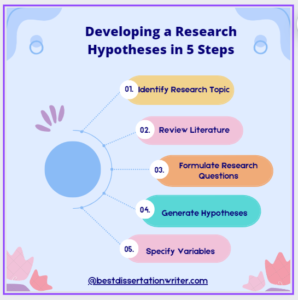Formulating a Strong Hypothesis in Dissertation Writing

What is a Hypothesis in Research?
A research hypothesis is a statement or prediction that proposes a association between variables. It is a very important section in the quantitative research, and specify the direction that the research will take.
Hypothesis serves as a tentative explanation for observed phenomena, guiding the investigation and providing a framework for data collection and analysis. Research hypothesis usually includes two variables, hence it is a relationship between the two variables.
Hypothesis development process should be well-defined, and involves asking a question, defining variables involved such as null and alternative, basis for testing them, design studies, and should be able to identify changes in the dependent variable.
Hypothesis is a specific connection between the existing knowledge, theories, and research questions, aiming to advance understanding in the field by empirically testing the proposed relationships between two or more variables. You can use them to formulate a research question and collect data for your research.
“Struggling with research aims, questions, objectives, or hypothesis? Find expert assistance at bestdissertationwriters.com. Our skilled writers ensure precision and clarity in your academic endeavors. Get top-quality support for your dissertations and research papers today.”
What is alternative hypothesis?
The alternative hypothesis, denoted as H1 or , proposes that there is a significant difference, effect, or connection between variables being studied.
It is accepted if the data provide sufficient evidence to reject the null hypothesis in favor of the alternative.
What about the null hypothesis?
The null hypothesis, denoted as , suggests that there is no significant difference, effect, or relationship between variables being studied.
It serves as the default assumption or baseline in statistical hypothesis testing.
Researchers aim to either reject the null hypothesis in favor of the H1 or fail to reject the null based on empirical evidence obtained from data analysis.
Types of Research Hypotheses
Generally, the type of hypothesis to be adopted depends on the conducted background research on the research problem. There are mainly two types of hypotheses, both of the hypotheses should be tested using different statistical methods:
- Null Hypothesis (H0): Suggests no significant difference, effect, or association between variables. Null hypothesis states default assumption and is tested against the H1.
- Alternative Hypothesis (H1 or Ha): Alternate hypothesis usually proposes a significant difference, effect, or connection between variables, contrary to the null hypothesis. It’s what researchers aim to provide evidence for through statistical analysis in academic research.
However, these hypotheses can be further divided into different groups such as:
- Simple Hypothesis: Posits a direct relationship or difference between variables. This is also known as associative hypothesis. Simple hypothesis predicts between key variables in the entire research.
- Complex Hypothesis: This hypothesis must give the direction and nature of the relationship or difference between variables. This includes experimental hypothesis predicting the relationship between IV and DV.
- Directional Hypothesis: This hypothesis might predict the direction of the relationship or difference between variables. A causal hypothesis proposes existence of specific relationship between one variable and the other
- Non-directional Hypothesis: Is an effective hypothesis that predicts the existence of a relationship or difference without its direction.
- Nondirectional H1: This hypothesis predicts the differences which exists but does not its direction.
Difference between Independent and Dependent Variables (DV)
Independent variables (IV) are factors that are manipulated or controlled by the researcher in an experiment. They are the inputs or causes that the researcher intentionally changes to observe their effect on the DV. Both of them can be hypothesis can be tested.
Dependent variables, on the other hand, are the outcomes or responses that are measured or observed in an experiment. They are the variables that are expected to change in response to variations in the independent variable(s).
“Struggling with research aims, questions, objectives, or hypothesis? Find expert assistance at bestdissertationwriters.com. Our skilled writers ensure precision and clarity in your academic endeavors. Get top-quality support for your dissertations and research papers today.”
Hypothesis Examples of Independent and Dependent Variables
Here are examples of hypotheses with independent and DV, you can use them to as a guide to write a good research paper:
- Example 1:
- Hypothesis: Increased caffeine intake (IV) leads to improved memory retention (DV) in college students.
- Example 2:
- Hypothesis: Exercise frequency (IV) correlates positively with cardiovascular health (DV) in middle-aged adults.
- Example 3:
- Hypothesis: Employee job satisfaction (IV) influences organizational productivity (DV) in a corporate setting.
- Example 4:
- Hypothesis: Exposure to violent media content (IV) is associated with increased aggressive behavior (DV) in adolescents.
How to Formulate a Hypothesis
Here’s a simplified approach to formulating a hypothesis in five steps:
- Identify the Research Topic: Choose a specific area of interest to focus on.
- Review Existing Literature: Conduct a literature review to understand what is already known about the topic and identify any gaps or unanswered questions.
- Generate Research Questions: Based on the literature review, develop clear and focused research questions that address the gaps or issues identified.
- Formulate Hypotheses: Derive statements or predictions that propose potential association between variables based on the research questions. Ensure that hypotheses are specific, measurable, and logically connected to the questions.
- Specify Variables: Clearly define the independent and DV involved in each hypothesis, ensuring they are operationalizable and measurable.
Research Question vs Hypothesis
The main difference between a research question and a hypothesis lies in their nature and purpose:
- Research Question:
- A research question is an inquiry that guides the direction of a research study.
- It is typically broad and exploratory, aiming to understand a phenomenon or address a specific aspect of the research topic.
- They are open-ended and do not make predictions or assumptions.
- Hypothesis:
- A hypothesis states a falsifiable statement or prediction that proposes a specific connection between variables.
- It is derived from the question and serves as a tentative explanation for the observed phenomenon.
- Hypotheses are specific, measurable, and typically predict the outcome of an experiment or study.
Importance of a Testable Hypothesis
- Guides Research Design: A testable hypothesis provides a clear direction for research, guiding the selection of variables, research methods, and data collection procedures.
- Fosters Objectivity: By formulating specific predictions, a falsifiable hypothesis encourages researchers to approach their study objectively and systematically, reducing bias in data interpretation. This helps to answer to your research question.
- Facilitates Data Analysis: A falsifiable hypothesis enables researchers to identify the appropriate statistical tests and methods for analyzing data, helping ensure that research findings are valid and reliable.
- Supports Scientific Rigor: Testable hypotheses are fundamental to the scientific method, allowing researchers to conduct experiments and gather evidence to support or refute their predictions.
- Advances Knowledge: Through empirical testing, falsifiable hypotheses contribute to the accumulation of scientific knowledge, driving innovation and discovery in various fields.
How to Write a Hypothesis
Hypothesis is written through different key steps:

- Identify Variables: Determine the IV and DV involved in your study.
- Formulate a Testable Statement: Write a clear and specific statement that predicts the relationship between the variables.
- Specify Directionality (Optional): If applicable, define the direction of the relationship (positive, negative, or non-directional).
- Ensure Falsifiability: Ensure that your hypothesis is falsifiable, meaning it can be proven false through empirical testing.
- Use Clear Language: Write your hypothesis in clear and concise language, avoiding ambiguity or complexity.
- Review and Refine: Review your hypothesis to ensure it accurately reflects the question and is logically sound.
For example, if investigating the effect of study time on exam performance:
- H0: There is no significant relationship between study time and exam performance.
- H1: Increased study time is associated with higher exam performance.
How to Develop a Good Research Hypothesis
Writing this hypothesis involves considering several key factors. Therefore, you make sure your hypothesis follows all of them:
- Clarity: Ensure that your hypothesis is clear and specific, clearly stating the connection between variables.
- Testability: Formulate a hypothesis that can be empirically tested through observation or experimentation.
- Falsifiability: Ensure that your hypothesis may be proven false if the data does not support it, adhering to the principles of scientific inquiry.
- Relevance: Hypothesis that addresses a meaningful question or problem in your field of study.
- Scope: Keep your hypothesis focused and manageable, avoiding overly broad or complex statements.
- Background Knowledge: Base your hypothesis on existing theory, research findings, or observations in the field.
- Variables: Clearly identify the IV and DV involved in your hypothesis.
- Directionality: If applicable, define the expected direction of the connection between variables (positive, negative, or non-directional).
- Consistency: Ensure that your hypothesis is consistent with previous research findings and theoretical frameworks.
- Language: Use clear and concise language to articulate your hypothesis, avoiding jargon or unnecessary complexity.
By considering these factors, you can write a hypothesis that effectively guides your research and contributes to the advancement of knowledge in your field.
“Struggling with research aims, questions, objectives, or hypothesis? Find expert assistance at bestdissertationwriters.com. Our skilled writers ensure precision and clarity in your academic endeavors. Get top-quality support for your dissertations and research papers today.”
Frequently Asked Questions on Formulating a Hypothesis in Dissertation Writing
1. What is a hypothesis in the context of dissertation writing?
A hypothesis in dissertation writing is a question formulated as a predictive statement that proposes the relationship between two variables to be tested in the research study. An experimental hypothesis anticipates the alterations that will occur in the dependent variable when the independent variable is manipulated.
2. How do you develop a hypothesis for a research project?
Developing a hypothesis would involve clearly defining the independent variable and the dependent variable, ensuring it is falsifiable and statistical, and predicting the expected outcome based on the connection between variables.
3. What is the difference between a null hypothesis and an H1?
A H0 states that there is no significant relationship between the variables being studied, whereas an H1 predicts the presence of a relationship or difference.
4. Can you provide examples of a good hypothesis?
A good hypothesis is one that is clear, specific, and directly relates to the research problem. For example, “Increased exposure to sunlight leads to higher vitamin D levels in individuals.” This type of hypothesis should be ready to supporting the theory being investigated, direction of the effect, as well as supporting the idea being investigated.
5. How important is it to have a hypothesis in a research study?
A hypothesis is essential in guiding the research process, ensuring the research design is focused, and providing a clear direction for collection and analysis of data. Therefore, hypothesis states results are due to chance and are not significant if the H0 is rejected. A defined hypothesis allows comprehensive understanding of knowledge in the field of research. In some cases, independent variable is manipulated to generate results, and at times results are not due to such manipulations.
6. What is the process of hypothesis testing in dissertation writing?
Hypothesis testing involves setting up a statistical framework to evaluate the H0 and determine whether the data collected supports or rejects the hypothesis proposed. Non-directional hypothesis states that the results are significant based on the included variables but does not specify the involved direction.
